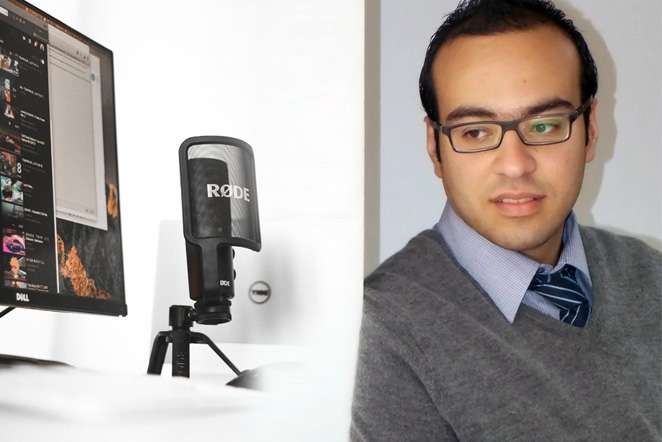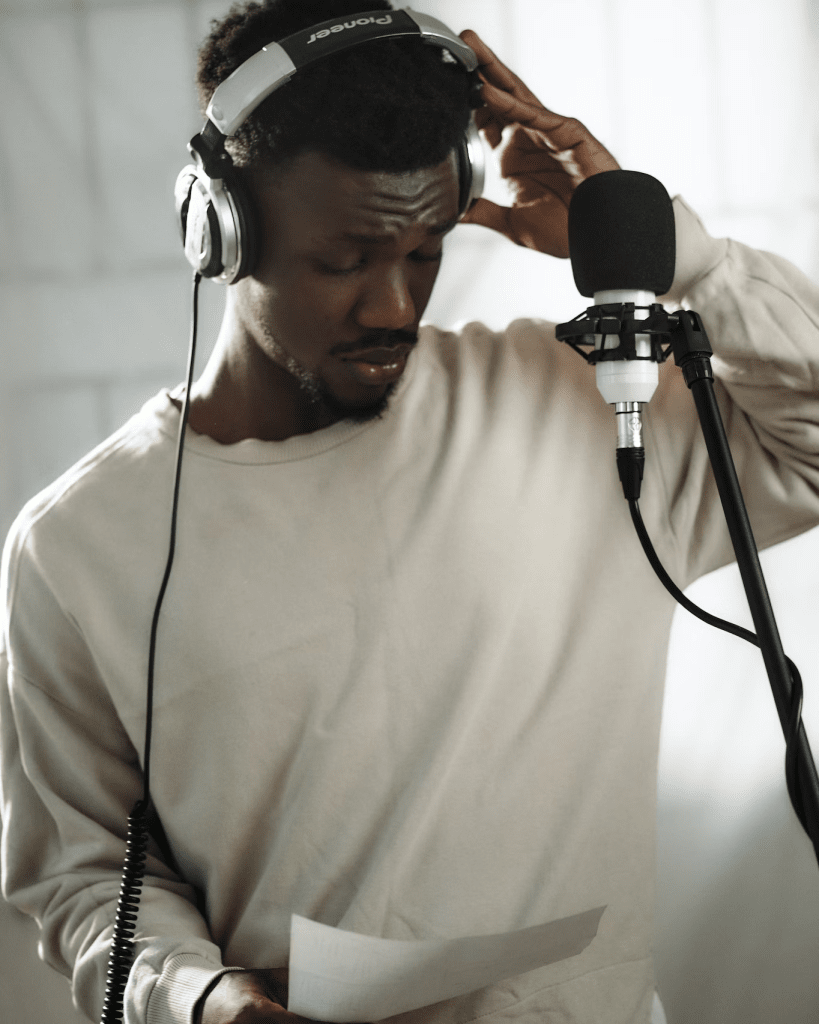
Voice talent: We have the take ready, we will play it back and take your comments.

Sound engineer: Playing back in 3,2,1…
Ad playing back” Bla bla bla only for 4.99$”
Client: I don’t think I heard that well, is it only me?
Account manager: I heard it well I have no problem
Creative director: bravo!
Client 2: I don’t feel the performance was warm enough.
Someone we don’t know1 : I agree
Linguist: I think you miss pronounced a letter!
Someone we don’t know 2: ……..
Someone we don’t know 3:…..
Someone we don’t know 10: …… but nods his head.
This is a sort of a typical scenario from a voiceover live directed session. Years ago when I was told about my first live directed session, I was so excited, You have all the concerned parties all in a single web call. You get all the feedback and the necessary approvals; I thought it was brilliant. This is in addition to many other pros like: Clear communication, where you can receive the brief in the client’s own words. This direct interaction during the session is sometimes a brilliant way to understand more about the project rather than just reading a brief from a document. One time I was doing a short character in an e-learning program and the instructions missed an important detail that we didn’t know. Luckily, I had the guy from the training company with us online to correct me and give us the appropriate explanation to correct what was needed on spot. Collaboration is also one other benefit as some discussions between the talent, creative director and client might help create a better performance. One last thing is the ease of execution to some projects that weren’t as easy before, Like recording with a talent from a far away country or a different time zone. Although it might be challenging but I still see it as a pro as it made it possible.
But unfortunately, many of the times the sessions didn’t run as smooth as I expected. The pros that were listed in addition to others, weren’t used effectively in favor of the project. and the reason here isn’t because of the nature of the technology used, but more of how people maybe unconsciously abuse the technology. Long ago when in-studio recordings were the norm, all the concerned parties were the only ones required to attend. The ones who had a real and valuable input. And the client usually hired the agency and talent that he thought had the adequate experience to carry out the project. If the client had the experience, he usually had this valuable input coming from his understanding of the industry and his brand. If not, he usually relied on his agency that he trusts and the talent they chose as an expert in what he is doing.
Lately and because of the ease of technology, I feel that usually the sessions aren’t as successful as they used to be in studio. I understand that live directed sessions made some things that weren’t doable before doable. But you can easily see that this privilege is being abused. Sometimes people attend these virtual sessions because they simply can as there is no physical barrier now to their existence. They interfere with the creative process even if they aren’t really experienced about that. I think the in-studio sessions had this aura that made clients feel that this is big and maybe complicated and we need to trust these people in what they are doing, they are simply experts. But unfortunately, technology removed this barrier.
I remember this project where I was an agent to another talent for one of the regional campaigns. The client told us that he will carry out the necessary bookings for the studio and that the brand team will attend. The first disaster we faced was that the studio had no internet connected to their devices. The sound engineer had to carry his phone throughout the whole session so that the brand team and the creative director listen to the takes. And I really have no clue how they managed to book the studio without asking these simple questions about the studio’s preparations. The second disaster was that only one out of 10 people attending was able to understand Arabic but not the local dialect, but they still insisted on attending and have comments on how they feel about the take. This meant we had to receive multiple feedback from a number of people who weren’t really adding something beneficial, leading to more lost time due to unnecessary retakes which makes the talent bored and very much unhappy about trying something different or creative. Finally The output for them was ok, but for me it wasn’t ok at all. The whole process was wrong. It was an abuse for something that was supposed to make a better output.
At another time where I was the talent and I was hired through a regional talent agency, there was someone, who I don’t really know who he was, was making comments on my dialect and grammar that was totally wrong and influenced by his local dialect. My agent who is coincidentally a linguist and a voice director too, had to get into a huge debate within the session and waste some valuable time just to make it clear that this is wrong and would hurt the brand. It is not a matter of taste rather than being totally wrong as a language. He simply made the comments because he can. The agency finally saved us through interfering and acknowledging our comments because they trust my agent.
I think it is the agency’s role to make sure that they facilitate the session in the best way possible through their accumulative experience and making sure that they only invite those who are concerned and have valuable input to the creative process. At the end, can the finance team approve and judge your next creative campaign?